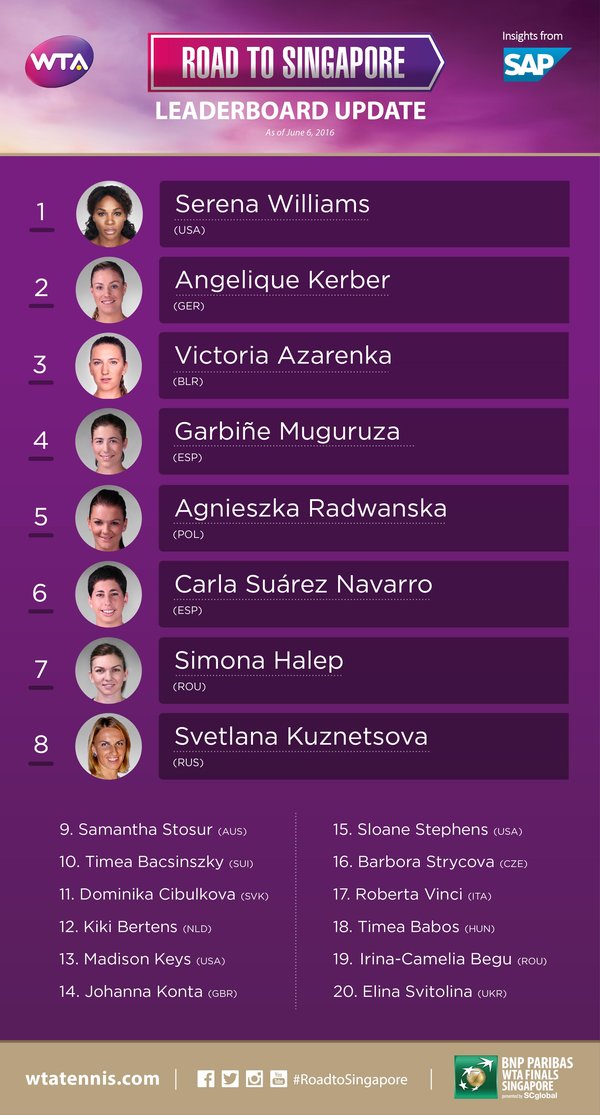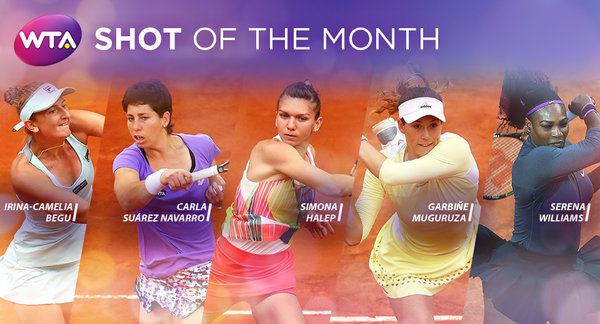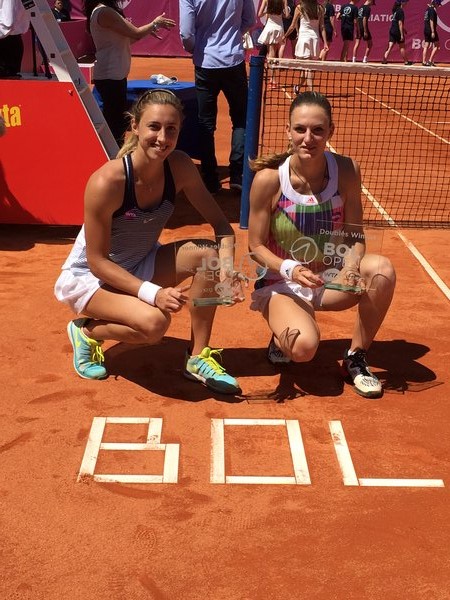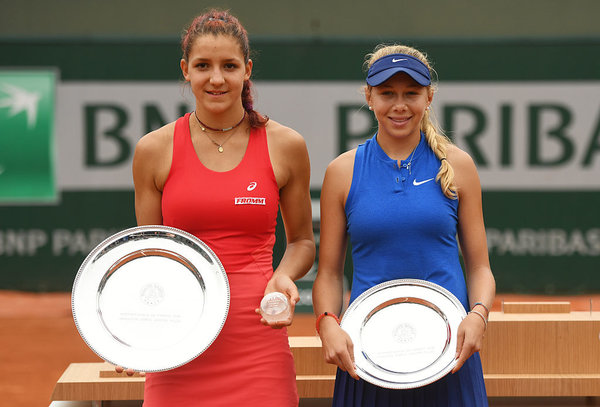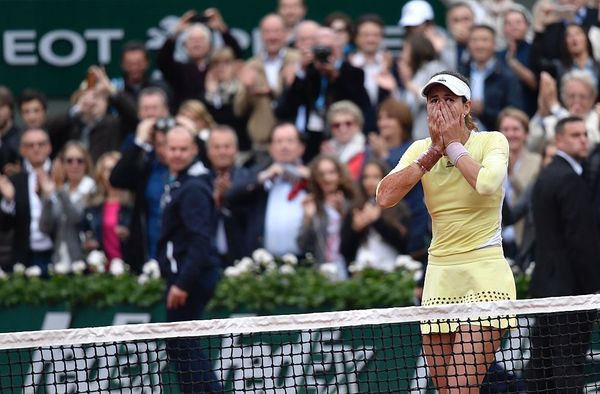PARIS, France – After one hour and 43 minutes of pounding the cover off every Babolat tennis ball that came her way, leave it to Garbiñe Muguruza to cap off her stunning performance in Paris with the most unexpected of shots: a topspin lob winner.
“Serena was in front of the ball so I didn’t know if it was in or out,” Muguruza said. “I looked at the chair umpire and chair umpire doesn’t want to say anything. Line judge doesn’t want to say anything.
“I was like, Did I win Roland Garros? What happened?”
Muguruza herself had to wait until she heard the “Game, Set, Match, Mademoiselle Muguruza” call from the chair umpire to realize what just happened. Serena Williams looked in disbelief as the ball hit the baseline. And then the 21 major champion, who had seen her quest for a record-tying 22 majors thwarted by a confident, gutsy young upstart, did what everyone else in the stadium leapt to their feet to do.
She clapped. Well done. Too good.
That single shot from the eventual champion, and that single gesture from the game’s Great Champion, summed up what transpired on another cold, grey day in Paris, as No.4 seed Muguruza barreled her way to a major breakthrough, beating top-seeded Serena, 7-5, 6-4 to win Roland Garros. Muguruza became the first Spanish woman to win a major since Arantxa Sánchez Vicario in 1998 and, with her title run, she’ll be the first Spaniard since Sánchez Vicario to be ranked No.2 in the world come Monday.

“For Spanish people, this is the tournament,” Muguruza said. “When you’re a kid and you practice on clay you always [say], ‘Oh, I wish I could win Roland Garros.’ Today is a great day.”
The win capped off a meteoric rise, one that seemed to start right here in Paris two years ago, when a then 20-year-old Muguruza, ranked No.35 and unseeded, ran roughshod over Serena to stun the American with a 6-2, 6-2 win in the second round. That win, Serena’s most lopsided exit from a Slam, would foreshadow things to come. Muguruza had the game to overpower Serena. Few women in the game can say that.
“I just have a very aggressive game,” Muguruza said. “I go for my shots with no regrets, even if I play to the fence.”
A little over a year after that French Open win, Muguruza found herself in her first major final at Wimbledon last summer. Across the net was, once again, Serena. The two have now played five times, with all their matches coming at the Slams. Serena prevailed, 6-4, 6-4 to win her 21st major title and Muguruza was clearly second best that day. Her nerves let her down but her game did not. Shot for shot she could handle the World No.1. But what the Spaniard lacked was experience and the mental fortitude to just get out of her own way and let her game flow.
Enter Sam Sumyk. The two paired up last fall and the results were immediate. She won her biggest title at the China Open and became the second woman ever to make the semifinals of the BNP Paribas WTA Finals Singapore presented by SC Global in her tournament debut. The only other woman to do that just happened to be the only other woman born in the 1990s to win a Slam, Petra Kvitova. Well, the only woman until Muguruza joined her today.
The big emphasis for Team Muguruza-Sumyk: Control. Control your emotions by controlling only what you can control. Consider everything else – your opponent, the scoreline, the circumstances – nonsense. Let it fall away. Play the point. It’s that simple.

“I have been saying during the whole week to be less emotional,” Muguruza said. “To believe more that I’m here because I deserve my place here. I earned it. I played well. I earned to be here in the final.”
Pull up an old tape of Muguruza from last year and you’ll see a woman who wore her emotions all over her body. The frustration was evident, the anger after a run of bad points audible. Watch her now and there is very little of that. She still rages underneath the surface, but the effort to keep it in control is plain to see.
“You just have to find a way to think of what I have to do, what is under my control,” Muguruza said. “How am I going to play this next point? Ok, this is how I’m going to play. Don’t think that it’s 4-3, I have a break point, this is a final of a Grand Slam. All this kind of stuff is just going to make you play worse. It’s not going to help you to concentrate on what you really want to do. That’s a little bit how I try and control it even though sometimes your arm is shaking because you’re nervous.”
In Saturday’s final, the months of working on her composure paid off. She never panicked in the fourth game of the first set, when Serena made a charge and earned two break points. Muguruza saved one with an ace. After sneaking out the hold in a long four-deuce game, she broke in the next game when Serena fired a double-fault.
Two games later, Serena would get that break back to get on serve. Again, Muguruza stood tall. She stuck to her game plan, played point by point, and eventually broke to take the first set 7-5. In the second set, with Serena serving at 3-5, Muguruza saw four Championship Points come and go. If there was a time for her to wobble it would be the next game, as she served for the title.
No muss, no fuss. She served it out at love, wiping out any hope of another legendary Serena comeback.

“Every match I played until I reached the final I was a little bit improving,” Muguruza said. Indeed, since losing the first set of her tournament to Anna Karolina Schmiedlova, Muguruza had not dropped a set en route to the final and spent less time on court than Serena. “Today was just that challenge. You got to face the best player in the final. You know you’ve got to perform well. Your chances of winning playing bad are very low.
“I knew, ‘Come on, Garbiñe. This is your chance again. Go for it. Just go for it. And breathe.'”
Serena gave Muguruza room to breathe. There were question marks surrounding Serena’s form and fitness heading into the final. Her tight quarterfinal wins over Yulia Putintseva and Kiki Bertens did not inspire much confidence. And yet, the American came out firing on Saturday. She moved and played above expectation given her two previous efforts, but Muguruza played the big points better.
Serena finished with seven aces to four double-faults, hitting 23 winners to 22 unforced errors. But she was just two for eight on break points. Muguruza hit four aces to nine double-faults, hitting 18 winners to 25 unforced errors, and going four for 10 on break points.
“She won the first set by one point,” Serena said afterwards. Muguruza won 42 points in the first set to Serena’s 41. “I mean, that just goes to show you really have to play the big points well, and I think she played the big points really well.”
In the end it was Serena’s serve, her most precious weapon, that let her down. She served at 61% in the first set and that dropped to 53% in the second, finishing at 49% for the match, her lowest of the tournament. Her success rate on second serves was also her worst of her tournament, winning just 43%. All this while serving as hard as she had all tournament, topping out at 121.8 mph and averaging at 108.1 mph. In all, Muguruza broke Serena four times, earning 10 break points in the match.
Muguruza became just the second woman to ever beat Serena in a clay court final (Henin) and just the third woman to ever to beat Serena twice at Roland Garros (Henin, Capriati).

“I think I’m ambitious,” Muguruza said. “I think I have a strong character and I like competition. I like to compete. I like to play against the best players. This is a source of motivation for me.
“I’m very happy, because today I proved to myself that I can play really well, that I can manage my stress and win against one of the best players in the world.”
For the third consecutive major a first-time winner has broken through, twice at the expense of Serena. At the US Open it Flavia Pennetta. At the Australian Open it was Angelique Kerber. Muguruza admitted she thought about Kerber’s win on Friday night.
“When you see people that are winning and there’s new faces, [it] makes you think like, I can be one of those faces. I can be the one who — Hey, if Kerber can I can, or whoever is there.”
Reflecting on her last two losses in major finals this year, Serena dismissed any implication that she’s succumbed to the pressure of chasing No. 22. “I think in Australia, Kerber made 16 errors in three sets, you know, so what do you do in that situation? Today Garbiñe played unbelievable. The only thing I can do is just keep trying.”
All photos courtesy of Getty Images.


